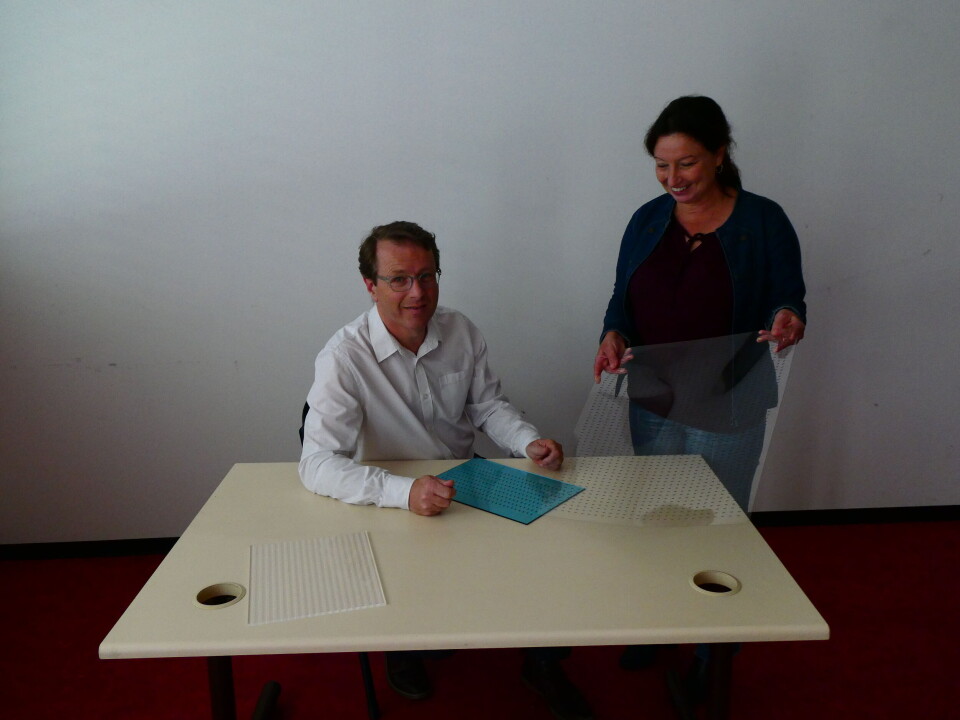-
E-cigarettes pose health risks, warns France’s health watchdog
The devices have “possible medium- and long-term” health effects, the warning says
-
French MPs vote in favour of renewed recognition of UK medical degrees
Post-Brexit rules mean UK degree holders have been limited in their ability to work in France
-
Death after sex on work trip classified as workplace accident under French labour law
Judges said: “To have sexual relations is part of everyday life, like taking a shower or having a meal.”
Mosquito screen reinvented by French couple after mesh misery abroad
Their polycarbonate solution also lets in more light and cools air coming through

A French couple who became frustrated by wire mesh mosquito screens while working in Mauritius have built an innovative alternative that lets in light and keeps the room cool.
François Capitaine, a medical equipment engineer, and his wife Nathalie Gauduchou, a physicist, developed their screen using polycarbonate – the sort of plastic used to make spectacle lenses.
Holes lower temperature but keep mosquitos out
Using a computer-guided laser cutter, sheets have long, narrow holes cut in them, which are too small for mosquitoes to pass through.
The shape of the holes has also been optimised to lower the temperature as gases pass through them.
“With air at 29C outside, the air coming through the screens is cooled to 25C without any mechanical or electrical energy being used,” said Ms Gauduchou.
“And with hotter temperatures outside, the difference in temperature rises.”
‘Not an air conditioner’
However, Mr Capitaine warned that people should not view their patent-protected product, called Mostiglass, as an air conditioner.
“In hot weather like we have been having, you have to learn to use it to the maximum advantage. This means opening windows with the screen in place during the night, and then keeping it in place in the morning until the air coming in is hotter than the house.
“At this point, close the shutters and windows as normal. Over a period of days, the temperature in the house will drop.”
Tiger mosquitos see demand rise
Mostiglass has been sold since 2019, mainly to local governments for schools and care homes, but demand is increasing elsewhere too.
“With tiger mosquitos, which bite during the day, spreading through France, there is growing interest from homeowners in mosquito screens,” said Mr Capitaine.
Read more: 64 French departments on red alert for tiger mosquitoes
Mesh frustrations
“In Mauritius, we were in a home with traditional wire mesh mosquito screens and we became frustrated because they did not work very well, were fragile and made rooms in the house dark.
“These are all problems we have overcome.”
Fits between window and shutters
For houses with inward opening windows and external shutters, the cheapest Mostiglass option, at around €200, is for a magnetic strip to be fitted between the window and the shutter, which is then used to fix a Mostiglass screen.
Alternatively, and more expensively, a design based on a Georgian sash window (known as a fenêtre à guillotine in France) has been developed using aluminium frames, again to fit between the window and the shutters.
A final solution is to have a roll-down screen for around €200 per window. However, this comes without the cooling benefits of other options because the polycarbonate used is too thin, and the standard 10-year guarantee, including against yellowing, is shortened to five years.
Other fittings include one developed for patio doors.
100% success rate
“We have done tests using the smallest mosquitos there are on the islands of Mauritius and Réunion, with 100% success,” said Mr Capitaine.
“The tiger mosquito is relatively large and they just do not pass through. The holes are not tall enough for them to fly through.”
Screens are made to order at a workshop near Bordeaux.
They have been approved by the World Health Organisation as effective against mosquito-borne diseases, and the company is considering how to market them outside France.
Tiger mosquito misery
Tiger mosquitos are continuing to spread across France, now reaching north of the Loire, and experts warn that all of France will be affected in a few years’ time.
Read more: Tiger mosquitoes: new case of native dengue fever confirmed in France
The black-and-white-striped insects bite throughout the day and are able to breed very quickly in small puddles of water.
In Asia, where they originate, they are spreaders of viral diseases, but so far cases of chikungunya, which hit Réunion in 2006, and other illnesses have not established themselves in mainland France.
Sterilisation programme
A programme in Réunion saw sterilised males released into the wild and proved to be successful. The number of tiger mosquitos in test areas dropped by half, researchers said in March.
Similar schemes might soon be introduced in France, especially in the south.
Read more: Traps set in trial attempting to control tiger mosquitoes in France
‘Plague of mosquitos’
The Camargue seaside resort of Grau-du-Roi, in Gard, was hit by a plague of mosquitos, including tiger mosquitos, earlier this year, with internet posts detailing numerous tales of tourists being ‘eaten alive’ in the town.
Related articles
Mosquitoes make their return in France: Tips on keeping them away
Drones can control spread of tiger mosquitoes, French study finds
Mosquitoes in France: A scientist's advice for keeping them away
























